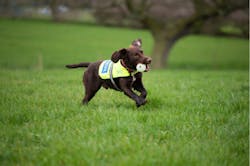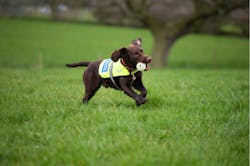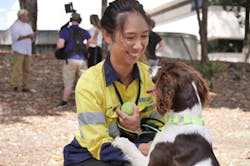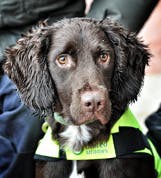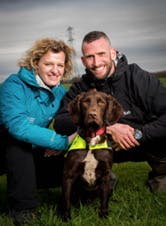Sniffing out leaks
Why water utilities are turning to dogs in a digital age
Despite the availability of advanced software, algorithms and Big Data, a handful of utilities are opting for another way to pinpoint leaks: dogs. We look at how the new canine recruits are doing in Water Corporation in Australia and United Utilities in the UK.
By Tom Freyberg
United Utilities is training 16-month old cocker spaniel Snipe to detect water leaks
Ever since humans domesticated wolf cubs nearly 30,000 years ago, dogs have become man’s best friend not only in the home but in the workplace. With a sense of smell 40 times more powerful than ours, dogs have been trained to not only detect drugs and explosives over the years, but also cancerous cells.
If that wasn’t enough, dogs have also been trained to assist people after seizures; alerting hard-of-hearing persons; children with autism and even assisting people with Type 1 diabetes – trained to sniff for a particular odour that relates to low blood sugar.
As part of a new development, water utilities are now recruiting canines as part of their drive to pinpoint and find water leaks.
United Utilities
Providing water services to 3.2 million homes and 200,000 businesses, United Utilities is currently training three dogs as part of its battle against leakage. Called Snipe, Denzel (after actor Denzel Washington) and Tico, the sniffer dogs have been recruited to work in the North West of England – a notoriously wet region where sorting leaks from the puddles can be a challenge.
Of the three dogs, Snipe is a 16-month old cocker spaniel and is being trained by ex-military dog trainers Ross Stephenson and Luke Jones. Snipe was a stray rescued in Ireland before joining UU for his training.
Speaking to WWi magazine, Stephenson says the training involved taking drinking water, adding additional chlorine and getting Snipe to “learn” the smell, and then over time diluting it back down to normal levels. He then took his loyal companion to locations where United Utilities had confirmed leaks and put him to work there. Once Snipe had found the leak, matching up with data from HQ, it enabled him to reward the dog.
The idea is that following heavy rainfall, when it is difficult to pick out a leak along a wet field, Snipe will be deployed to sniff out water containing chlorine at extremely low concentrations. To date, Snipe has found leaks coming from as much as two metres underground.
Particular set of skills
Just like actor Liam Neeson, spaniels may have a particularly set of skills for the job yet it’s not the dog breed that dictates whether he or she is suitable.
“We don’t say there is a particular type of dog that is best for this job,” he says. “It’s whether or not the dog has the drive to work. We do an initial assessment on the dog to make sure it has the drive and ability to learn.”
Once trained, the new utility recruits are relatively low maintenance, requiring a comfy bed, healthy supply of dog biscuits and a “ball to play with”, quips Stephenson.
His company has previously trained dogs for military purposes, including searching for explosives and drugs and he even trained the animals to “search for bed bugs in housing schemes”.
United Utilities is combining data from satellite imagery with Snipe’s heightened sense of smell in order to pinpoint leaks. Although a multitude of technologies are being made available to utilities for this purpose, they come at a high cost, according to leakage manager Hannah Wardle.
“There is a lot of advancement in technology and innovation and we’re embracing that – some of it is really useful but often it’s expensive as well,” she says. “It’s about getting that balance between new, emerging technologies and existing methods to find and locate leaks.”
She adds: “We’re trialling the use of satellites and drones to get a bird’s eye view of a particular area, but the devil is in the detail, and pinpointing the exact place to start digging is more difficult than you might think. Snipe is going to be an invaluable asset to the team.”
Clearly multiple methods are needed to tackle the ongoing challenge of leakage. United Utilities had water losses of 439 million litres of water per day between 2016-2017. However, the company says it has “halved our rate of leakage since the early 1990s and beaten our leakage target every year for the last 10 years”. Facing 25,000 leaks per year, it spends an estimated £27 million to tackle leakage, which includes installing acoustic loggers on the pipe network, trialling new technologies or approaches.
Kep and one of her handlers, Water Corporation engineer Nicola Williams
Sticks, diviners and Kep
For some, this development is a welcome sight but it’s the collaboration with existing, high-tech equipment that is important.
“Using a canine makes a lot of sense and definitely belongs in the same category as listening sticks and water diviners,” says Oliver Grievson, group manager for the Water Industry Process Automation & Control Group. “They are simple techniques that provide that extra tool in the box for pinpointing a leak location. I’ve been known to tap on a pipe and listen myself to see if the pipe is full or not. It’s a basic technique that simply works although you are not going to apply the technique in a widespread way. You need to narrow down the area as much as you can before employing the technique, as not doing so will mean you are basically wasting a lot of time and resources.”
Many miles away from North West England utility Water Corporation in Australia is also seeing success by adopting a four-legged friend into its team.
Called Kep, after the Aboriginal word for ‘water’ in the language of the Noongar people, the female Springer Spaniel is part of a trial to determine if a dog can detect leaks in areas where traditional leak detection technologies are “not always cost effective”, says the utility.
Snipe poised for action
Kep is the daughter of Tommy – an experienced detection dog who took part in Water Corporation’s initial trial in June 2017. She arrived in Perth, after undergoing intensive training in Sydney with one of Australia’s leading dog trainers, Steve Austin. She was trained to recognise the scent of scheme water, and ignore all other scents such as rain water, pipes and fittings. Rather than a pension and bonus scheme, as might be case with human employees, Kep’s reward is to chase a tennis ball. Simple pleasures.
Kep’s first job will be to sniff out any leaks in about 400 kilometres of mains. Managing more than 34,000 kilometres of water mains across 2.6 million square kilometres in Western Australia, in 2017 Water Corporation had the target of 20 leaks per 100km of main. It actually achieved 17.9 leaks, according to its 2017 report, so met the target.
Clearly keen to not rest on its laurels, the utility is also seeing success in customer engagement using Kep.
“Kep the dog is the greatest customer engagement tool we’ve had for years,” says CEO Sue Murphy, speaking to WWi magazine. “She’s perfect natural fit for social media. While lots of people distrust politicians, no-one has any distrust of a little spaniel in a coat. She wears her safety gear and off she goes and does her work.
Four-legged friend: Cocker spaniel Snipe with UU leakage manager, Hannah Wardle and ex-military dog trainer, Ross Stephenson
“It fascinates me that as the bulk of our business is getting more digital, with more sensors, remote sensing and data analytics, the most engaging tool we have is a dog. As we get more technical, people feel less in control. They want us to be modern and know what we’re doing, and find leaks but the sense of community is being lost. However, Kep the dog is a great symbol of our engagement with our community and our understanding of the community.”
Even the country’s water minister, Dave Kelly, has commented on the success of Kep. He said: “A trial last year estimated that the use of leak detection dogs in identifying broken water mains could be two times cheaper than other traditional methods.”
RIP Hector
Back in 2014 and UK south coast utility Southern Water was one of the first utilities to deploy a dog: Hector the bloodhound, a nine-stone former police dog. Rather than leaks, the utility was using Hector to sniff out fats, oils and grease (FOG).
Costing over £10 million to clear, Southern Water has to deal with 17,000 blockages caused ever year to the company’s 40,000km network of sewers.Although Hector received a lot of media attention when he was first recruited, Southern Water has since said that he has unfortunately died. The utility was unavailable for comment and it’s not certain whether the bloodhound died on the job, fighting grime instead of crime.
What is clear is that dogs have been trained around the world to help mankind in multiple, vital tasks. Under pressure to reduce leakage and keep the public on side, utilities are increasingly turning to digital platforms, such as social media, as a way to help with their customers. However, as witnessed by United Utilities and Water Corporation, recruiting a dog might just be one additional way to meet both these challenges using a more tangible approach, four-legged approach.
Tom Freyberg is chief editor of WWi magazine.
